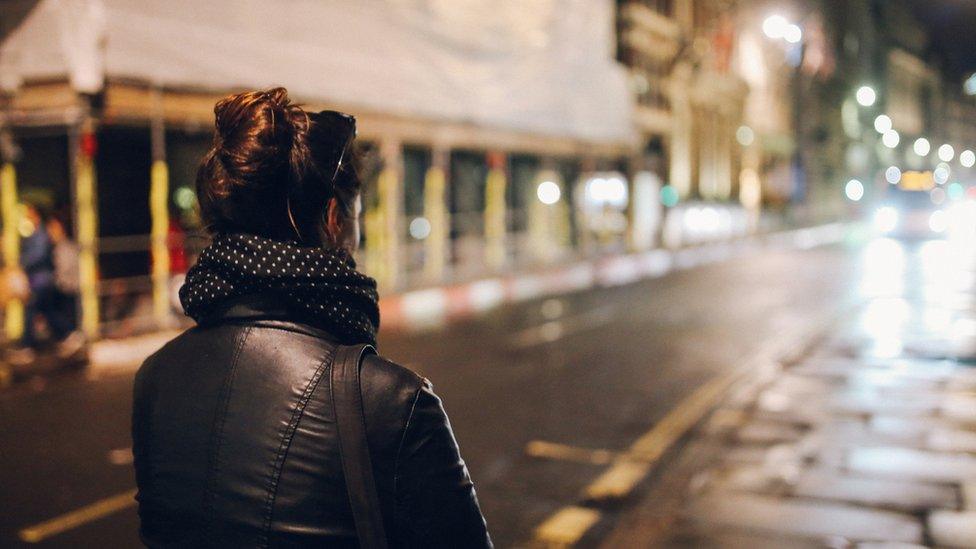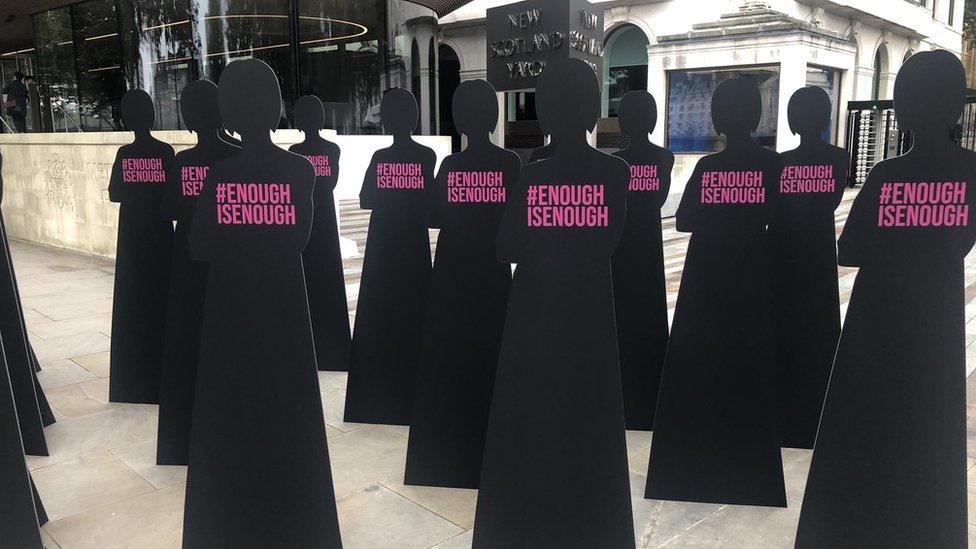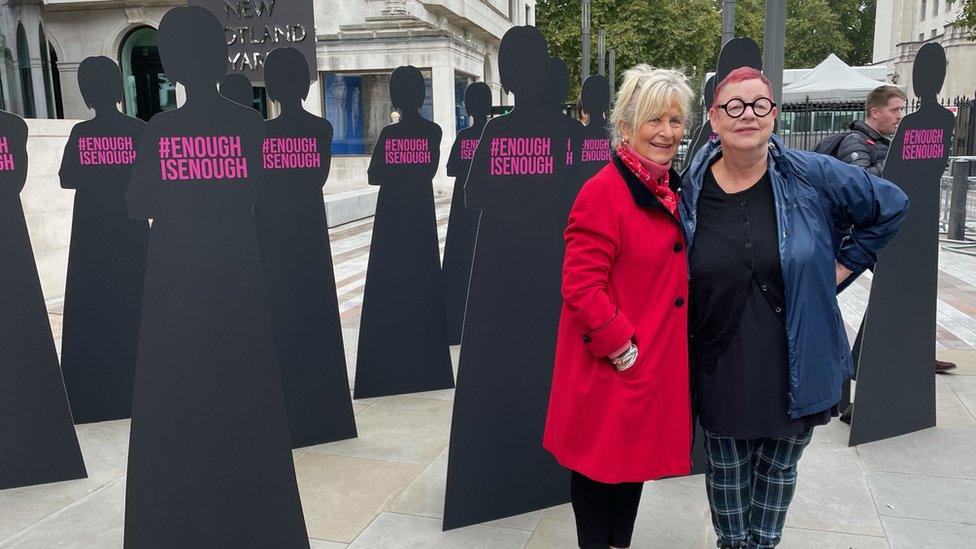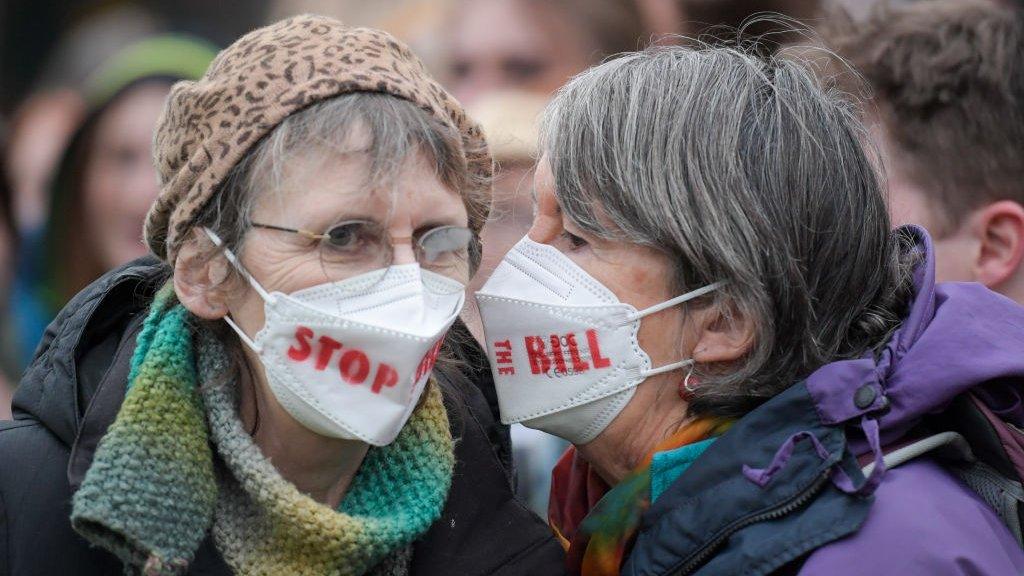Charity seeks new police focus on domestic abuse
- Published

A domestic abuse charity has called for an amendment to a new policing bill to recognise the seriousness of violence against women and girls.
Refuge wants sexual violence, domestic homicide and domestic abuse specifically named as crimes that police and other public bodies must develop strategies to prevent.
It wants the bill's "serious violence duty" to include those crimes.
The Home Office said protecting women and girls was its top priority.
A spokesman said it would consider any amendments to the Police, Crime, Sentencing and Courts Bill - which is currently going through Parliament - as they are raised.
Refuge launched its campaign for the amendment with an event at New Scotland Yard, the headquarters of the Metropolitan Police.
It brought 16 silhouettes to represent the 16 women said by the Femicide Census to have been killed by former and serving police officers since 2009., external

The charity unveiled its campaign for the amendment with 16 silhouettes for the 16 women it says were killed by former and serving police officers since 2009
It comes days after Home Secretary Priti Patel said there would be an inquiry into the "systematic failures" that allowed Wayne Couzens to continue to be a police officer, despite concerns over his behaviour.
Couzens was sentenced to a whole-life prison term earlier this week after he kidnapped, raped and murdered Sarah Everard while he was a serving officer, using his police warrant card.
The case has reignited debate over women's safety and further scrutiny of policing of crimes against them.
Speaking at the event, the charity's chief executive Ruth Davison said there was an "enormous opportunity" for the home secretary to bring about real change for women and girls by amending the policing bill.
Making sexual violence, domestic homicide and domestic abuse part of the serious violence duty would give police and other bodies "the ability to act differently" to address these crimes, she added.
The duty requires police, councils, criminal justice and health agencies to work together to prevent and tackle serious violence., external
She told the BBC: "As Refuge, we've been working on the frontlines of violence against women and girls for years, so we have known it's an epidemic, but it's been hidden behind closed doors.
"We're saying today enough is enough. These are the words of our own home secretary who said she's going to do everything in her power to end this epidemic.
"We say these words are really encouraging but they're not enough, what we need now is action."

Labour peer Baroness Helena Kennedy QC and the comedian Jo Brand attended the event at New Scotland Yard
Baroness Kennedy, a patron of Refuge, said she intended to table an amendment to the bill in the House of Lords, adding such a change was needed to put violence against women and girls "at the top level of the commitments and priorities of policing in Britain".
Comedian Jo Brand, who is an ambassador for the charity, called on police to take more seriously the "hidden epidemic of domestic violence".
Campaigners say misogyny - prejudice against women - is one of the "root causes" of violence against women and have called for it to be made a hate crime in England and Wales.
But earlier this week, Prime Minister Boris Johnson said he did not support calls to make misogyny a hate crime, insisting there was "abundant" existing legislation to tackle violence against women.
In July, the government unveiled its strategy for tackling violence against women and girls, external - with measures such as a 24-hour rape and sexual assault helpline, £5m of funding to tackle violence in public places at night, and an online tool on which women and girls can log areas where they have felt unsafe.
It also saw Deputy Chief Constable Maggie Blyth appointed to the role of a new national policing lead for tackling violence against women and girls.
A Home Office spokesman added: "Protecting women and girls from violence and abuse is a top priority for this government.
"That is why the violence against women and girls strategy...sets out the government's ambition to increase support for survivors, bring perpetrators to justice, and, ultimately, reduce the prevalence of violence against women and girls."
Related topics
- Published5 October 2021

- Published28 April 2022

- Published5 October 2021
